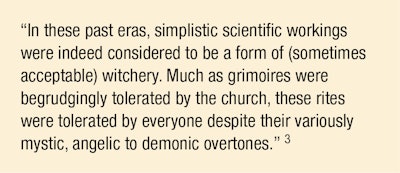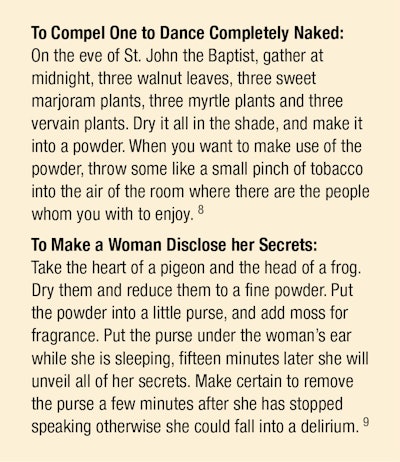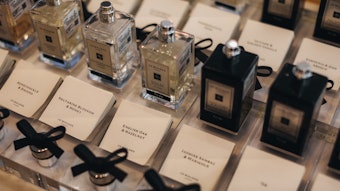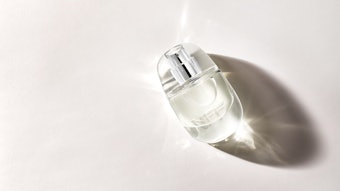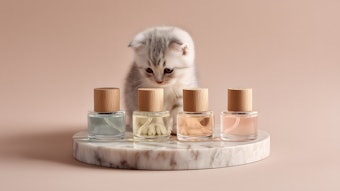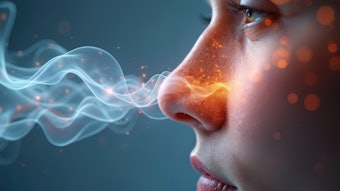
I have held ancient spell books in my hands; the heady aroma of parchment, fading inks, cracking glue and hundreds of years of dust enveloping me in an intoxication of scent. The arcane pages resonate with a certain power to be sure: symbols scrawled or carefully set in type on paper; some calling forth demons and spirits, others offering hope for maidens looking for love, others for safe passage of ships or protection against the evils of sickness. I recall one fragile book from the early 1700’s housed at the Portico Library in Manchester UK, calling for the hair of a young lover, crushed rose petals, names of the witch and object of their desire written in blood on parchment, and an apple cut in half, in which to carve and seal the names. It promised to secure the desired lover, binding them with these aromatic materials. Another book’s well-worn and well-stained pages, Gypsya Sorcery, was re-shelved in a private reading room due to too many people casting spells in the library’s domed hall. Within these pages, ancient folk spells and their intricate use of herbs and spices fill one with fragrant wonder.
In many spell books, known as grimoires, herbs, flowers, roots and resins are called upon to facilitate the magical workings of the readers—occult recipes, so to speak, that regaled the use of olfaction as a very powerful tool in casting. Essences and aromatic smoke have been linked with spirits and gods in ancient cultures, and the earliest of spell books. The Egyptian Book of The Dead is full of incantations calling for pure essences, incense and unguents to make the deceased more pleasing to the gods.
“As their peculiar perfume is the chief association with spices, so sorcery is allied in every memory to gypsies. And as it has not escaped many poets that there is nothing more strangely sweet and mysterious the scent of cloves than it that of flowers, so the attribute of inherited magic power adds to the romance of these picturesque wanderers.” 1
Opening the Mouth of Osiris
“Untie these rags on my face. Open my mouth. Unbind my Legs. Give me Charms and incense and cake. Pry my Mouth with the red knife of heaven and I will speak of days unending….” 2
The Opening of The Mouth Ceremony demanded that a mummy be fumigated with incense and anointed with oils and unguents amidst incantations, before an adze, a ritualistic knife, was symbolically drawn across the eyes, nose and ears of the dead; so that they then, through the very force of the aroma and will of the gods, could be given a heartbeat, breath, site and smell, before being sent off to the underworld in a heady plume of resinous perfume. One must think of the absolute sacredness of holding pure essences in hand—the echo of the echo of the original flowers, herbs, woods and resins extracted with the greatest care by priests and priestesses in ox fat, or tinctured in palm wine.
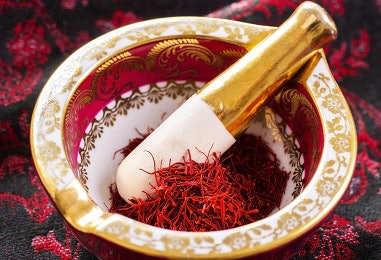
Zozimo’s writings on Maria Prophetessa, a known alchemist in the 1-3rd century AD, tell of her being the first to experiment with the alembic still, an apparatus used to this day. The alembic was designed to employ the four elements in order to mutate organic matter. Flowers and vegetation are of the earth, yet when put over water, heated with fire, die, and exhale the essence of their scent captured in steam. Thus earth, water, fire and air are in an interchangeable cycle, harnessed to the mage’s will. The transformation of flowers to essential oil spoke of the ultimate magic: finding the pure center of God’s creation, the ‘breath of the divine.’ Indeed, essential oils transcend mortality, for the very existence of the oil confounds the death of its first organic form.
The Essence of Alchemy
12th century alchemical texts embrace the idea of early science and chemistry, while grimoires seem to be more centered on the accepted magical practice often concerned with spells for getting along in everyday life, blended with a heavy dose of mysticism. This split in texts is perhaps why alchemical practices were generally more accepted, and the magical practices became something to fear. In fact, organic essences, when wielded by the skilled practitioner of magic and accompanied by ritual and incantation, were more akin to a religious belief that with the right intent, promised great results. This helped to secure the witch archetype as someone who not only held knowledge of the mysteries of the earth but was powerful mystical, dangerous and wild.
13th-century alchemist, Albertus Magnus’s writings bridged this magical gap. In his text, The Book of Secrets, the use of scented smoke for magical purposes was called perfuming. His spells brilliantly link alchemy with supposed fantastical results ranging from spirit invocation, calling forth rainbows and promises of invisibility. Such spells may very well have inspired spells of later grimoires, and thus the outrageous beliefs of a witch’s powers in the 17th century that inevitably lead to witchcraft accusations and thousands of deaths. The Book of Secrets attests to the purportedly miraculous nature of aromatic ingredients for one’s craft:
“Another perfuming, which when thou makest, thou sees outwardly green men, and men of many shapes and infinite marvels which are not discerned for their multitude….Take Vermilion, and the stone of Lazulus, and Pennyroyal of the mountains and beat it all to a powder and sift it. Mix it with the fat of a Dolphin fish, Horse or Elephant, make grains or corns after the fashion of rice, and dry them in a shadow. Perfume in it when thou wilt and it shall be done that is said.” 4
“A perfuming to see in our sleep what thing is to come of good and evil:
Take the blood of an Ass congealed, and the fat Lupi Cervini, and a sweet incense or gum called storax and also styrax; gather it all together by equal weights and let them be mixed, and grains or corns be made thereof, and let the house be perfumed with them, that thou shalt see him in thy sleep that shall shew to thee all things.” 5
15th-century philosopher, Heinrich Cornelius Agrippa von Nettesheim, wrote a treatise called Libri Tres de Occulta Philosophia (Three Books on Occult Philosophy), in which fragrance conjoined with planetary formation and harnessing of the four elements, forms the basis of his work. Like Maria Prophetessa, Agrippa finds a changeable interconnectivity between the elements: Earth dissolves in water, water, evaporating becomes air, air and earth being kindled passes onto fire, fire extinguishes into air, but being cooled after burning, returns to earth… Agrippa speaks of fire as having the power to both nurture and destroy, it drives away bad spirits and brings forth spirits of divine light (angels). He speaks of Earth as the center, the foundation of all living things animal, vegetable, mineral. Water allows the nurturing of earth and tampering of fire. But it is air, in which Agrippa finds a profound link to aromatic magic.
Agrippa’s works speak of air entering into humans and animals through their pours and mouths. This is the vehicle for Agrippa’s aromatic magic. Air is the breath, all-encompassing, both celestial and earth-bound. He explains air is the very cause of dreams, and most closely related to the idea of spirit and souls. Agrippa explains further that air, in particular, reacts to the actions of men. If one is killed in a certain place, and a man passes by the same place, the air is filled with the spirit and evil of that act, and a person will be affected by it-breathing in the evil, and feel fear.
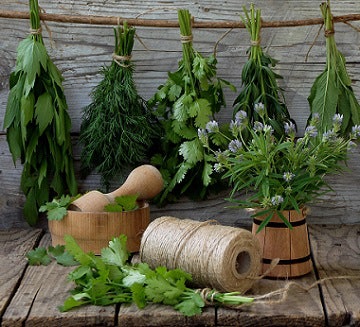
Through the concept of air both penetrating our bodies as well as containing our collective past actions, it can theoretically be manipulated. This is where we see the utilization of ‘fumes’ as an atmospheric altering. In this way, air as aromatic smoke takes on the form of clouds and can used as a kind of divination. Misty air can be a looking glass. Air, wind, and mist become something sacred and magical. Scented, air carries messages, reveals truths, and touches the realm of spirits.
“If coriander, smallage, henbane, and hemlock be made a fume, that spirits will presently come together; hence they are called spirits herbs...Also, it is said that a fume made of the root of the reedy herbe sagepan, with the juice of hemlock, and henbane, tapsus berbatus, red sanders and black poppy makes spirits and strange shapes appear.” 6
“There is no fume like Spermaceti for the raising of spirits: wherefore if a fume be made of that, and aloes, pepperwort, Musk, Saffron, red Storax tempered together with the blood of a Lapwing, it will quickly gather any airy spirits together an if it be used about the graves of the dead, it gathers together spirits and the ghosts of the dead.” 7
Unseen Powers
Scent has long been associated with unseen powers, veiled as it was throughout history in mysterious ritual. In grimoires of the 15-1700’s, fragrance is often a tool to inspire love or stave off sickness. The cooking of certain herbs, the sacrifice of animals, powdering of roots, and practice of incantation and ritual could conjure demons and helpful spirits, destroy one’s enemy, cure illness or in some cases, raise the dead. While certainly herbs, roots and flowers can be powerful enough to change emotions, cause hallucinations and even death; it is the belief in their power as a catalyst... a tool with which to center one’s craft that renders them so very powerful in the magical Zeitgeist of the times.
Perfume is no different. Perfume enchants, entrances, seduces… lingers with the sensual cloying that holds us in its sway, and causes ripples of feeling in our bodies. The remembered scent of a lover can cause a blush years later, the smell of baking bread inspires comfort, the acrid scent of spoiled food causes disgust. There is a magic to olfaction in its very nature: it controls, directs, spellbinds, and has done so through the thousands of years of our human existence. It is no wonder that while reading volume upon volume of grimoires from the 1200’s to this modern era, that fragrance in all its forms, from fresh garlands of flowers to ground spices to aromatic smoke is noted in countless spells, interwoven in the sacred ritual of occult practice.
When researching within the Portico library, I soon realized that grimoires and tracts against witchcraft were laid side by side for me by the librarian on the Victorian side tables. At first glance, the books are like any others. But within, one finds endless accusations and trials of witchcraft; and the use of essences, poultices and unguents, once revered or at least tolerated, became the very evidence and cause for countless deaths.
In one such case in the early 1300’s, Alice Kyteler, known as Lady Alice, put on trial as a witch, was accused of making unguents—wax-based perfumes, with spiders, black worms, milfoil, and the brains and clothes of an unbaptized child. The unguents were said to cause faces of horned ladies to appear and conjure a demon who took the form of a cat, dog or man, who Lady Alice took as a lover. In return, her demon gave her great wealth. In addition, Lady Alice and her cohorts were said to have made potions to incite love, hate and murder. 10
We see accounts of the witchcraft trials where scent takes on a dangerous form. Unguents were said to seduce demons, and blends of herbs and flowers such as henbane and hemlock were anointed on witch’s bodies and used as flying potions. It is remarkable that materials once held in the hands of pharaohs and queens of ancient civilizations and wielded by great alchemists, thinkers and healers, could have been the very thing to cause so many to perish.
The history of fragrance is as mystical as it is violent, as alluring as it is mysterious. Perhaps this is why scent holds us in its thrall. Unseen, powerful, spellbinding… it is in every form it takes- from first flower to final essence, true magic.
Footnotes:
*A special thank you to the brilliant librarians at The Portico Library who made me feel like Hermione in their Potter-like reading room of magical wonders and flying books.
a The word “gypsy” is a derogatory term for Romani people, an ethnic group comprised of various tribes, all originating in India.
